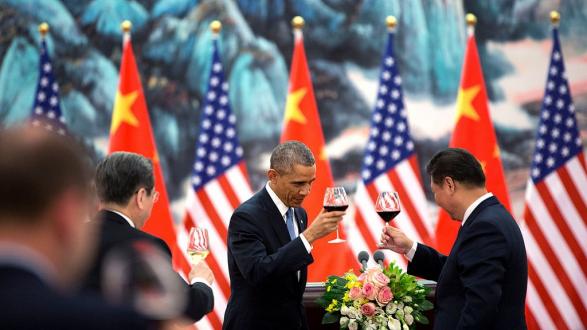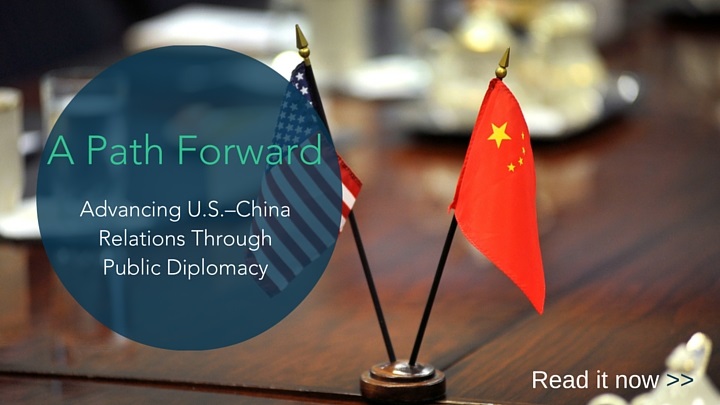The following is an excerpt from a new report by Pacific Council President and CEO Jerrold D. Green, Communications Associate Justin Chapman, and Events Officer Alexandre Moore on the role of public diplomacy in the U.S.-China relationship. The report was presented at the 2016 China-U.S. Diplomacy Summit held at Renmin University in Beijing on June 19, 2016. Read the report in full.
____________________
One of the most publicized and possibly damaging issues dividing the United States and China is the new Chinese law requiring foreign NGOs to register with the police and to submit budgets, among many cumbersome restrictions. To the United States and other outsiders, this is perceived as paranoia about alleged infiltration, espionage, and subversion by foreigners. The vast majority of foreign NGOs are performing vital work in China, and most Americans believe that Beijing should reevaluate this overreaching law.
On the topic of North Korea, Beijing has already stepped up its cooperation with Washington on sanctions, but Beijing is unwilling to go further and thus risk the destabilization of the Korean Peninsula. Accordingly, Washington must seek China’s assistance in freezing North Korea’s nuclear program, which would help to reinforce U.S.-Sino mutual trust and advance cooperation by avoiding the need for a buildup of U.S. military forces on the Peninsula. Such a buildup, while in the interest of the United States should North Korea’s nuclear program continue to accelerate, will only be seen by the Chinese as the U.S. government taking advantage of the situation in an attempt to contain China. Some in the United States are already calling for nuclear weapons to be returned to South Korea, and Kim Jong-un’s continued missile tests are not helping the situation. For China, cooperation with the United States on these matters also has the added benefit of bolstering its soft power and standing on the world stage, not to mention the potential to curtail the strength of the country’s jingoistic elements.
Washington recently missed two key opportunities to cooperate with China on economic development and trade.
Recently, Washington missed two key opportunities to cooperate with China on economic development and trade. When the United States decided not to support the Asian Infrastructure Investment Bank (AIIB), it lost a chance to work with China to set the bank’s agenda on environmental protections, human rights, anticorruption measures, and other governance standards. Additionally, by actively discouraging other nations from participating in the bank, the United States damaged its relationship with China as well as its credibility abroad, as the AIIB will be crucial for development in Southeast Asia.
Last year China surpassed Canada as America’s largest trading partner. Some Americans believe that it is imperative that China be included in the Trans-Pacific Partnership (TPP), the largest free trade agreement in a generation that is firmly centered on trade within the Asia-Pacific. China’s participation in the arrangement would be a financial boon to all parties and the reforms they would need to undergo in order to participate would allow the United States to better compete within China’s domestic market. Interestingly, during a recent address to the Pacific Council in Los Angeles, U.S. Secretary of State John Kerry said that China has inquired about what the process might be for entry into TPP. Meanwhile, China is pressing ahead on its own version of the trade agreement. There is ample room for collaboration and cooperation on this front.
For the United States to avoid missing additional opportunities, it should develop a clear and realistic path for China’s eventual participation in TPP and should begin exploring with China a role for the United States within or alongside the AIIB.
The United States should develop a clear and realistic path for China’s eventual participation in the Trans-Pacific Partnership.
Washington can also ramp up its support of exchanges with China. While the 100,000 Strong Initiative student exchange program reached its goal of increasing Americans studying in China, student exchanges are just the beginning. Professor Jay Wang, director of the University of Southern California Center on Public Diplomacy, wrote about the importance of initiating "dialogs and substantive exchanges between practitioners and scholars of public diplomacy of the two countries. Nurturing and sustaining a positive relationship between the two countries is consequential not only for the United States and China, but also for the world. And, it requires the active engagement of public diplomacy, which plays a crucial role in steering this vital relationship in a positive direction. Popular perception of each other matters, because it forms the climate of opinion in which policies and actions are considered, weighted, and pursued."
These solutions will not solve all of the problems between the United States and China, but they will go a long way towards avoiding real conflict between the two nations.
____________________
Dr. Jerrold D. Green is the President and Chief Executive Officer of the Pacific Council on International Policy. Read more about his background.
Justin Chapman is the Communications Associate of the Pacific Council on International Policy. Read more about his background.
Alexandre Moore is the Events Officer of the Pacific Council on International Policy. Read more about his background.





